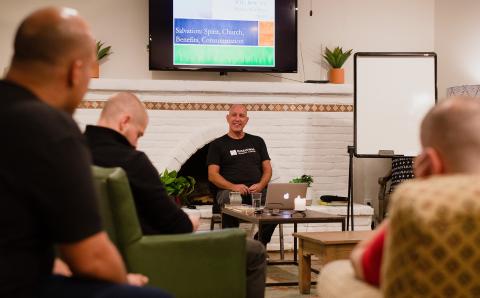Many websites contain lists of people who are said to have converted to Christianity shortly before their deaths. Sometimes these stories are corroborated by relatives and friends. The truth of these stories are sometimes debated because believers and non-believers sometimes use them to advance a religious or philosophical agenda.
Wikipedia, for example, mentions the debate about Charles Darwin’s deathbed conversion to Christianity. Those who take a dogmatic position in the “faith vs. science” debate can rally around and use his contested story one way or another.
I find the question of deathbed conversions unsettling. The topic is often engaged in an abstract and depersonalized way. But what if we reflect on how it might relate to a particular person’s fate before God?
Take your beloved grandmother as an example. Her rejection of God’s grace and the other choices in her life might have been for you a source of so much pain and misery. You’ve spent decades praying for her, pleading with her, and patiently hoping for her to experience the living God. All through the cancer treatments, it seemed that she was becoming even more bitter in her rejection of faith. But then, at almost the last moment, you witness a change of heart, a deep grief about the pain she has caused, and a desire to embrace the forgiveness and hope of Jesus. You are elated, even while you also know the heartbreak of this not happening earlier.
Could her change of heart have been a charade—a trick to comfort you in her dying days? It’s possible. Many treat conversion as little more than a magic spell, like a “get out of jail free” card played at a crucial moment in a losing game. Some might scheme that a quick prayer with their dying breath could tip the scales of eternity in their favor. Some might think it’s a safe gamble, whatever the stories might be afterward.
But believing that we can outstrategize God with our cunning wouldn’t be a deathbed conversion. Dietrich Bonhoeffer called it “cheap grace.” When it comes to the renewal God works by grace in the rebellious human heart, it is entirely God’s doing. We only respond—like taking a breath after CPR has been administered. Conversion isn’t really something that we do; it is always a free gift from God that we can only receive.
So what exactly are we seeking when we ponder this question? Are we looking for certainty, for ourselves or our loved ones (or our enemies)? Are we looking for a guarantee beyond the covenant grace and faithfulness of God? Are we struggling to trust God with another person’s life—or our own? Faith means being humble before God and acknowledging that God and God’s grace will accomplish the good God intends for us and our world. It’s not something we can ultimately figure out.
What we’re really grappling with in this question, I think, is God’s offensiveness. When we don’t live in grace, when we believe that everyone must pay their share, when we assume there’s no free lunch, when we must have ultimate control over our lives, then the idea of God’s boundless grace becomes a stumbling block—How could God accept them? How could God ignore everything they’ve done?—until, of course, we find ourselves in that place of last resort, with nowhere else to turn but to God. Then don’t we all want a God like the one we come to know in Jesus, one who will even take a thief on a cross with him, through a dying gasp, into paradise?
About the Author
Michael Wagenman is the Christian Reformed campus minister at Western University in London, Ont., where he invites undergraduate students to put their faith into loving service and mentors graduate students. His most recent book is The Power of the Church: The Sacramental Ecclesiology of Abraham Kuyper (Wipf &Stock, 2020).









